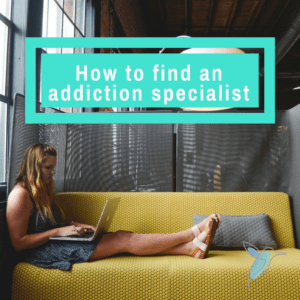How do you find out if you need an addiction specialist?
There are several standardized addiction assessments that are easy to administer at a physician’s office, the emergency department, or even on college campuses. These are typically brief and short to identify risk factors that a person may be suffering from addiction. Examples of questions included in these assessments are: Have you ever felt the need to cut down on alcohol or drug use? Have people annoyed you by criticizing your alcohol or drug use? Have you ever felt guilty about your alcohol or drug use? Have you ever needed a pick me up in the morning after a day or night of alcohol or drug use to keep you going (for example hair of the dog or taking a Klonopin to cope with a hangover)? Do you ever use alone when you’re bored?
Addiction is a specialty
It is critical that individuals seeking help for addiction choose an addiction specialist. This professional has extensive training and depending on the state, may have an additional license that verifies they are an expert in their field. Their training will include information on communicable diseases (STIs, HIV, Hep C), relapse prevention, addiction progression, treatments for specialized populations and basics of neurobiology.
In North Carolina, a Licensed Clinical Addictions Specialist is the highest license obtainable to treat individuals suffering from addiction. It is helpful to find an addiction expert because that person knows how to work with you to achieve recovery. Many traditional therapists without specialized training in the addictions field have difficulty with the constant change in motivation for sobriety and can become upset when a client relapses.
How do I know if an addiction therapist is right for me?
A positive sign that an addiction therapist is right for you is if they treat you with compassion and will also hold you accountable to your goals. Often times, urinary drug screens are used in conjunction with talk therapy to help the person in recovery remain open and honest about their use. It is also important the treatment professional understand of relapse as part of the disease and does not kick the client of therapy. One of the most detrimental actions a therapist can take is refuse to see a client after a relapse. Relapse is part of the disease and this can be the most effective time to create change in a person’s life.
Community resources to support recovery
It is important for the addiction specialist to be knowledgeable in community resources. Recovery is about getting the person involved in their life again and this frequently includes establishing relationships with other people in recovery through the attendance in community self-help groups (such as 12 step meetings, Refuge Recovery, SMART recovery, etc.).
There are many ways to get to recovery from substance use disorder. No one way is the correct way. I encourage my
clients to find what path helps heal their mind, body and spirit. I live on the coast and I have had several clients who find serenity and peace by visiting the beach. Several surfers I have worked with view the ocean as their higher power. Some find solace in yoga. A regular exercise program, smoking cessation plan, and a foundation of nutrition can go a long way in healing one’s body and increase the probability of remaining in a recovery lifestyle.
Ready to make a change? Subscribe to get 10 ways to change your substance use!
Are you ready to work with a specialist for your difficulties with substance use disorder? There is help. Schedule an Appointment




